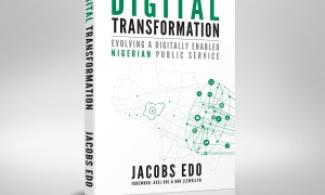
The public wants services to be delivered faster and better. Nigeria’s dependence on ever-fluctuating oil prices, which are today at the lowest in modern economic history, means that those improvements must be delivered at a lower cost than previously.
The book defines, justifies and outlines the process of digital transformation of the Nigerian public service. At the heart of this document is the process of public sector reform that is currently on-going in the nation, a process which has yet to formulate and implement a comprehensive and integrated strategy to digitise public service delivery and administration.
googletag.cmd.push(function() { googletag.display('content1'); });
The process of digital transformation encompasses, by definition, two concepts digitisation, and transformation. While digitisation is about making information and communication technologies integral to the Nigerian government’s function, transformation applies to addressing the fundamental weaknesses that continually challenge the public service. A digital transformation of the public service would enable it to embrace change including; digital technologies and other innovative approaches to service delivery and management; its working culture and redefining what makes working in the civil service worthwhile and rewarding.
The Nigerian civil service has real strengths. It exists to implement the policies of the government of the day, whatever that government’s political complexion. Its permanence and political impartiality enables exceptionally rapid transitions between governments. The majority of civil servants are dedicated, hard-working and have a deep-seated public service ethos.
But change is essential in Nigeria today. In order for the country to embrace the UN Global Sustainable Development Goals, its own Vision 20:20:20, the hopes and aspirations of its citizens and of public servants themselves, far-reaching transformations must be implemented.
googletag.cmd.push(function() { googletag.display('content2'); });
The public wants services to be delivered faster and better. Nigeria’s dependence on ever-fluctuating oil prices, which are today at the lowest in modern economic history, means that those improvements must be delivered at a lower cost than previously.
This means the drive for greater efficiency must be relentless and productivity must continue to improve. Generally, public sector productivity has often been static (and sometimes regressing) while the private sector has improved year after year. The need for efficiency and economy mean government work, wherever possible, must become digitally enabled and integrated within all Ministries, Departments and Agencies (MDAs).
For more information about the author - visit www.jacobsedo.com or visit the book website - www.digitaltransformation.com.ng alternatively the book is now available on Amazon - http://a.co/2mKPnTu
googletag.cmd.push(function() { googletag.display('comments'); });